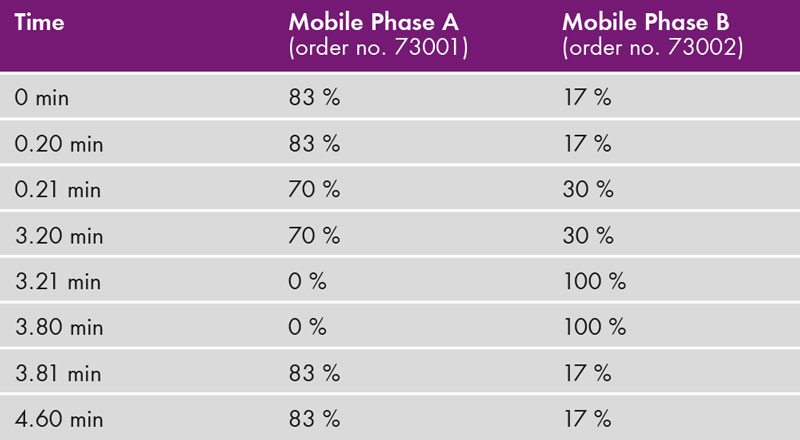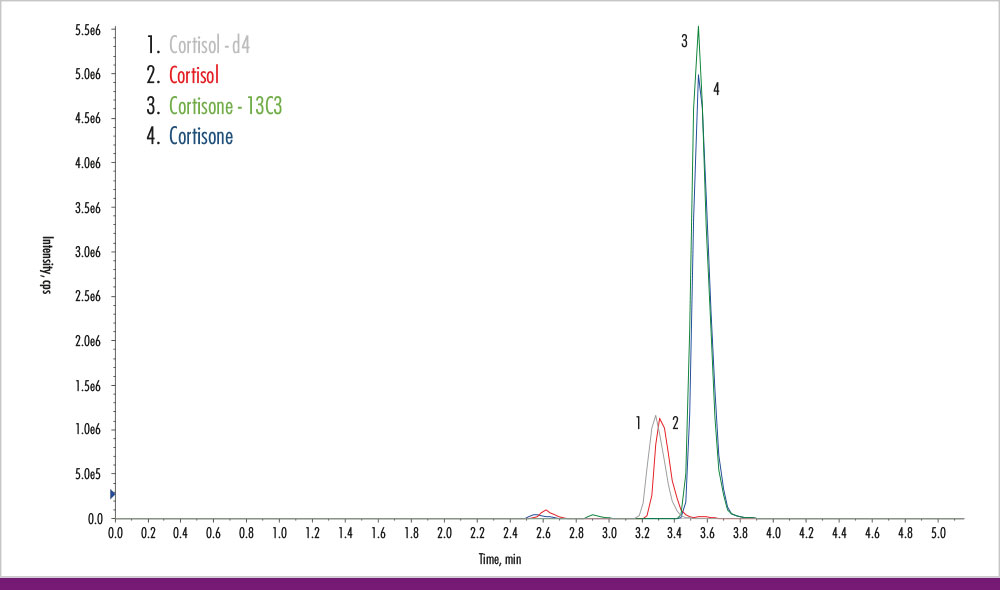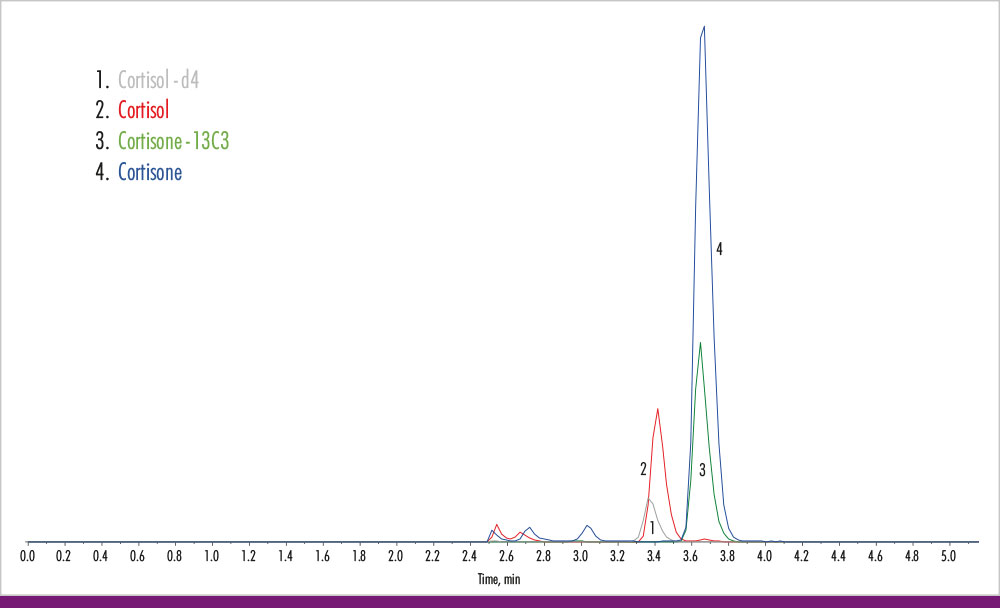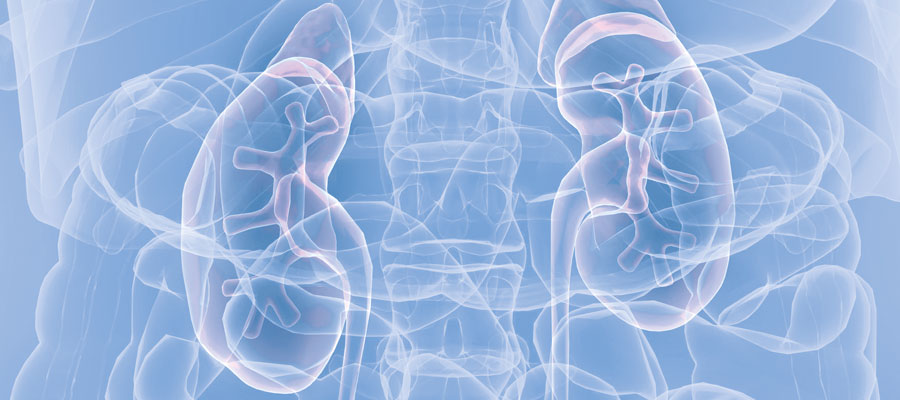Determination of Cortisol and Cortisone in Urine with LC-MS/MS*
Introduction
Glucocorticoids play an important role in the human body and are relevant for a range of diseases. This makes the determination of endogenous glucocorticoids an important research tool to investigate cortisol and cortisone status and glucocorticoid metabolism. The concentrations of free cortisol and cortisone in 24-hour urine are able to represent intrarenal concentrations [1], thus precisely reflect the proportion of biologically active serum cortisol [2].
Urine sampling is straightforward and non-invasive and can be performed without medical personnel. This is particularly advantageous for children and psychiatric subjects, as it avoids a stress-induced increase in the cortisol concentration in contrast to blood sampling. Here, we describe a reliable protocol for the determination of cortisol and cortisone in urine by LC-MS/MS with Chromsystems components.
Material and Methods
Sample Preparation
The sample preparation was performed based on the Chromsystems MassChrom® Steroids assay. For equilibration, a 96 SPE Well Plate (order no. 72057) was put onto a Waste Plate (order no. 72058) and equilibrated with 800 µl Equilibration Reagent 1 (order no. 72077). After centrifugation (1 min at 400 x g), the effluent was discarded and 800 µl Equilibration Reagent 2 (order no. 72008) was added into each well and centrifuged as above. For the sample preparation, 500 µl of the well homogenised sample was pipetted into each well of the 96 SPE Well Plate and 50 µl Internal Standard Mix (order no. 73104/RUO) was added. The 96 SPE Well Plate was shaken for 2 min at 600 rpm, centrifuged (1 min at 400 x g) and the effluent discarded. After that 700 µl Wash Buffer (order no. 73106/RUO) was added, centrifuged (1 min at 400 x g) and again 700 µl Wash Buffer was added and centrifuged to dryness (2 min at 3000 x g). The 96 SPE Well Plate was then placed onto a Collection Plate (order no. 80056). In the last step 400 µl Elution Buffer (order no. 73105/RUO) was added to each well and centrifuged (1 min at 400 x g).
The prepared samples were diluted with 400 µl Dilution Buffer (order no. 73103/RUO) and the Collection Plate was sealed with an adhesive seal (order no. 80059). The Collection Plate was shaken for 2 min at 600 rpm and finally transferred for injection (up to 50 µl) into a light protected and cooled (+10 to +15 °C) autosampler. Rinsing Solution (order no. 73009) of Chromsystems was used as needle rinsing solution for the injector.


Table 1: Binary gradient (Flow rate: 0.5 ml/min)
LC-MS/MS Analysis
The separation was run on a Shimadzu Nexera HPLC instrument with a binary gradient (details in Table 1) by using the analytical column (order no. 73100) of Chromsystems at +25 °C. The analytes were determined on a SCIEX 4500MD™ mass spectrometer with electrospray ionisation in positive ion mode (performed by an external laboratory). Mass transitions of internal standards and analytes are provided in Table 2.


Table 2: MRMs of analytes and corresponding internal standards
Results
A protocol for the determination of the two analytes cortisol and cortisone in urine has been established. The defined mass transitions of this procedure can be found in Table 2. As shown in figures 1 and 2, the run time is at approximately 4.6 minutes. Intra- and interassay precision was determined between 1.7 % and 4.2 %. The lower limits of quantification were 0.87 ug/l and 0.81 µg/l for cortisol and cortisone, respectively (see tables 3 and 4). The linearity of the method was verified using the 6PLUS1® matrix calibrators of Chromsystems (order no. 73139/RUO) up to concentrations of 251 µg/l and 246 µg/l.


Table 3: Intra- and Interassay data at different concentrations


Table 4: Limits of quantification


Fig. 1: Chromatogram of a 6PLUS1® Calibrator (Level 2). Analyte concentrations: cortisol 25.7 µg/l, cortisone 49.7 µg/l.


Fig. 2: Chromatogram of a real urine sample. Analyte concentrations: cortisol 90.6 µg/l, cortisone 158 µg/l
Conclusion
This application note describes a protocol for the determination of cortisol and cortisone in urine with Chromsystems components. Intra- and interassay and (analytical) measurement range are satisfactory for the analysis of human urine samples.
Ordering Information (To order the products or for a quote, please contact us here)
| Order No. | Product |
| 73103/RUO | Dilution Buffer, 40 ml |
| 73104/RUO | Internal Standard Mix, 4 x 5 ml |
| 73105/RUO | Elution Buffer, 40 ml |
| 73106/RUO | Wash Buffer, 70 ml |
| 73115/RUO | Tuning Mix, 1 x 1 ml |
| 73139/RUO | 6PLUS1® Multilevel Urine Calibrator Set Cortisol, Cortisone, 7 x 3.0 ml (lyoph.) |
| 0351/RUO | MassCheck® Cortisol, Cortisone Urine Control, Level I, 5 x 3.0 ml (lyoph.) |
| 0352/RUO | MassCheck® Cortisol, Cortisone Urine Control, Level II, 5 x 3.0 ml (lyoph.) |
References
1. Cuzzola A, Petri A, Mazzini F, Salvadori P. (2009) Application of hyphenated mass spectrometry techniques for the analysis of urinary free glucocorticoids. Rapid Commun Mass Spectrom. 23(18): 2975-2982
2. Bianchi L, Campi B, Sessa MR, De Marco G, Ferrarini E, Zucchi R, Marcocci C, Vitti P, Manetti L, Saba A, Agretti P (2019) Measurement of urinary free cortisol by LC-MS-MS: adoption of a literature reference range and comparison with our current immunometric method. J Endocrinol Invest 42(11): 1299-1305
*RUO: For research use only and not for diagnostic purposes.

